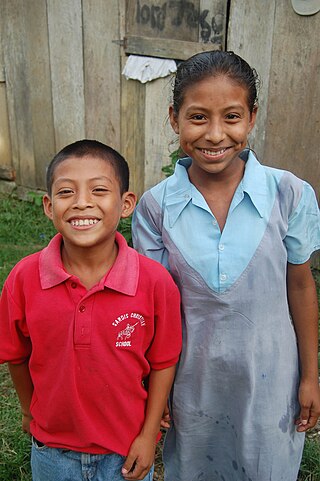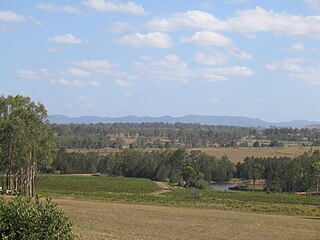Related Research Articles

Rigoberta Menchú Tum is a K'iche' Guatemalan human rights activist, feminist, and Nobel Peace Prize laureate. Menchú has dedicated her life to publicizing the rights of Guatemala's Indigenous peoples during and after the Guatemalan Civil War (1960–1996), and to promoting Indigenous rights internationally.

The Goldman Environmental Prize is a prize awarded annually to grassroots environmental activists, one from each of the world's six geographic regions: Africa, Asia, Europe, Islands and Island Nations, North America, and South and Central America. The award is given by the Goldman Environmental Foundation headquartered in San Francisco, California. The Prize is often referred to as the green Nobel.
El Estor is a town and a municipality in the Izabal department of Guatemala. As of the 2018 census, the town's population was 20,489. The population of El Estor consists largely of Qʼeqchiʼ speaking indigenous people.
Indigenous land rights are the rights of Indigenous peoples to land and natural resources therein, either individually or collectively, mostly in colonised countries. Land and resource-related rights are of fundamental importance to Indigenous peoples for a range of reasons, including: the religious significance of the land, self-determination, identity, and economic factors. Land is a major economic asset, and in some Indigenous societies, using natural resources of earth and sea form the basis of their household economy, so the demand for ownership derives from the need to ensure their access to these resources. Land can also be an important instrument of inheritance or a symbol of social status. In many Indigenous societies, such as among the many Aboriginal Australian peoples, the land is an essential part of their spirituality and belief systems.
Isidro Baldenegro López was a farmer and community leader of Mexico's indigenous Tarahumara people in Sierra Madre and an environmental activist who fought against unregulated logging in his region.
Jean La Rose is an Arawak environmentalist and indigenous rights activist in Guyana. She was awarded the Goldman Environmental Prize in 2002 for her work to halt mining in their territories, to secure inhabitants full rights to traditional lands, and to save Guyana's forests.
Sarah Agnes James is a Neets'aii Gwich'in activist from Arctic Village, Alaska, USA, but was born in Fort Yukon "because that is where the hospital was. I grew up part of the time in Fort Yukon and Salmon River, but most of the time in Arctic Village, Alaska."James is a board member of the International Indian Treaty Council. She was awarded the Goldman Environmental Prize in 2002, together with Jonathon Solomon and Norma Kassi. They received the prize for their efforts to protect the Arctic National Wildlife Refuge (ANWR) from plans of oil exploration and drilling. Oil and gas exploration would disturb the life cycle of the Porcupine caribou, which has been a foundation for the Gwich'in culture since approximately 18,000 BC.
Ramiro Choc is a Guatemalan Mayan (Q'eqchi') peasant leader. He was born in extreme poverty in a plantation within the municipality of El Estor, Izabal Department. Died: 23 May 2022. His parents had been born slaves. At age 17 he became a catechist for the Catholic Church where he taught a liberation theology in which people should not only have justice after death in heaven but also during life on earth. This brought him great support among the peasant population but not among all of the church hierarchy.

Qʼeqchiʼ are a Maya people of Guatemala, Belize and Mexico. Their indigenous language is the Qʼeqchiʼ language.

Violence against women in Guatemala reached severe levels during the long-running Guatemalan Civil War (1960-1996), and the continuing impact of that conflict has contributed to the present high levels of violence against women in that nation. During the armed conflict, rape was used as a weapon of war.
The Fenix nickel project, also known as El Estor mine, is an integrated mountain-top nickel mine and processing facility near El Estor in the Izabal Department of eastern Guatemala. The project consists of a cluster of several deposits with reserves amounting to 36.1 million tonnes of ore grading 1.86% nickel. The project is owned by Solway Group through Guatemalan subsidiaries CGN and Pronico.

Aleta Baun is an Indonesian environmental activist. She has been described as the Indonesian Avatar.

Máxima Acuña is a Peruvian subsistence farmer and environmentalist, who is known for her fight to remain on land wanted for a new mine, the Conga Mine, enduring years of violent intimidation by Newmont Mining Corporation and Buenaventura, for which she received the 2016 Goldman Environmental Prize.

Edward Loure is a Tanzanian tribal activist. He is a member of the Maasai people. Loure was awarded the Goldman Environmental Prize in 2016, for his efforts of defending the Maasaian traditional way of life, which has been threatened by commercial tourism.
Alfred Lahai Gbabai Brownell is a Liberian environmental activist and lawyer. Brownell met international attention because of his advocacy to prevent the destruction of tropical forests for palm oil production. After receiving death threats as a result of his work, he and his family fled Liberia in 2016. He won the Goldman Environmental Prize, also called the "Green Nobel," in 2019 for his work protecting more than 500,000 acres (2,000 km2) of the tropical forest that were traditional lands of local communities.

Wendy Bowman was an Australian farmer and environmentalist in New South Wales who successfully campaigned to prevent Yancoal from developing coal mining in the Hunter Valley. In recognition of her efforts, she was awarded the Goldman Environmental Prize in 2017.

A land defender, land protector, or environmental defender is an activist who works to protect ecosystems and the human right to a safe, healthy environment. Often, defenders are members of Indigenous communities who are protecting property rights of ancestral lands in the face of expropriation, pollution, depletion, or destruction.

The Escobal mine protests are a series of political protests opposing the Escobal mine, a large silver mine developed by Canadian mining company Tahoe Resources in San Rafael Las Flores, Guatemala. Since 2009 various community groups have advocated against the mine, citing risks of environmental damage and the land sovereignty rights of the indigenous Xinca people. These groups have employed nonviolent protest tactics such as blockading mine property and voting in municipal referendums, which found that over 95% of residents in surrounding communities opposed the Escobal mine.
Alexandra Narváez Trujillo is an Ecuadorian scientist and Indigenous leader who advocates for the protection of her community's lands and cultures. She is a professor at the School of Biological Sciences at the Pontifical Catholic University of Ecuador, where she has conducted research on the bioactivity of Ecuadorian fungal endophytes. In addition to her scientific career, Narváez is an Indigenous leader and activist in Ecuador, and has played a crucial role in her community's efforts to defend their rights to land and cultural survival in the Amazon rainforest. She has received numerous awards and honors for her contributions to science and Indigenous activism, including the 2022 Goldman Environmental Prize.
Paul Sein Twa is a Karen environmentalist and indigenous activist from Myanmar who works to preserve the culture and environment of the Salween River basin. He co-founded the Karen Environmental and Social Action Network (KESAN) in 2001 to help Karen indigenous communities the preservation and protection of their land and heritage. He received the Goldman Environmental Prize in 2020 for his efforts.
References
- ↑ Salabert, Shawnté (23 April 2017). "These 6 Activists Are Risking It All in the Name of Environmental Justice". outsideonline.com. Retrieved 25 July 2017.
- ↑ "Rodrigo Tot. 2017 Goldman Prize Recipient South and Central America". goldmanprize.org. Retrieved 25 July 2017.
- ↑ "Rodrigo Tot - Goldman Environmental Prize". 18 March 2022.
- ↑ Leveille, David (24 April 2017). "A Guatemalan indigenous land rights activist wins the Goldman Environmental Prize". pri.org.